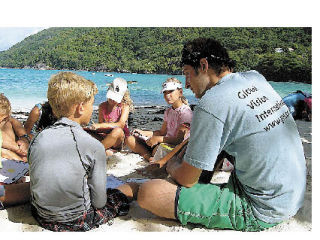While fellow Valley residents were dealing with the severe storms of winter, Mount Si High School and Running Start grad Josh Breeds was exploring the sand and surf of the Seychelles Islands in 80-degree heat.
Diving deep under the ocean and monitoring threatened coral beds, Breeds, 18, took part in a research expedition with Global Vision International from January through the end of March.
The Seychelles are a chain of 163 islands, about 1,500 miles off the east coast of Africa, in the middle of the Indian Ocean.
Breeds, the son of parents Chris and Trish, worked as a volunteer diver, collecting research data on the health of coral. His group is tallying its findings, but Breeds’ impression is that the corals are in trouble. He discovered that the algae that help the marine creatures thrive is dying, due to global warming. When the algae die, the coral die too.
His job was to see how healthy the coral were in individual quadrants, meter by meter. He found one remote spot where the diversity of the marine life was untouched. That area, however, is slated for hotel development.
Under the sea
Breeds, who is studying at Bellevue Community College and plans to pursue microbiology at a larger university, said he has always been interested in the marine world. He plans to earn his professional diving certification. Breeds has been diving for three years, and earned his first certification at 16.
On his back, he wears a tank with an hour of air, plus an emergency five-minute backup tank. He wears a special weighted vest, carries a dive knife, and has three sets of flashlights — two are backups.
When he prepares to dive, he goes through a rhythmic preparation.
“It’s like muscle memory,” he said. Once everything is attached, divers use the buddy system to make sure everything is working right. Then, it’s under the waves.
When divers are coming up, there is the danger that they can suffer decompression sickness, also known as “the bends,” from the pressure difference causing nitrogen from the air to bubble in their bloodstream.
Breeds’ team avoids this by always making a “safety stop” at 15 feet for five minutes.
Seychelles adventure
Breeds’ island trip was a lot of fun, but the living conditions were very different than home. For starters, the temperature never dipped lower than 82 degrees. His team stayed in quarters that were more military barracks than college dorm, with bare concrete floors. Mosquito nets had to be put up nightly, “otherwise you’d get attacked by every single bug you can think of.”
When the monsoon season hit, research halted due to 15-foot waves in the bay. Breeds’ group tried to work one day during monsoon weather. But the waves were so strong, the only way to get back in the boat was to wait for a wave to crash, and then hurl yourself into the boat.
At one point, Breeds was stung when his team was enveloped by a group of bluebottle jellyfish. The jellies’ stings were more painful than a bee sting, but Breeds had it easy. One team member was found to be allergic to the stings, went into anaphylactic shock, and had to be brought back to shore, given oxygen, and taken to the nearest hospital by boat.
Shipwreck
In the Seychelles, Breeds encountered three different shipwrecks. At 95 feet below, he went inside a sunken ship and came face to face with a four-foot long fish called a bonito at the entrance.
The ship was a 45-foot dredger that had been scuttled some 20 years before to help create an artificial coral reef. Going inside a sunken ship, “there’s absolutely no light inside,” Breeds said.
As he entered the sunken ship, he left a line that’s tied twice outside, so that he could find his way out, even if he lost visibility. He worked his way through the ship, in one door and out another, and then back.
Breeds wasn’t allowed to salvage anything due to regulations, though local stories say that Madagascar pirates left a good deal of loot in the Seychelles.
He did discover a diving mask, covered in barnacles, that had been on the ocean bed for a few months. The team scrubbed it, bleached it, and used it to replace someone else’s lost mask.
Breeds said he enjoys the tranquility of the bottom of the sea.
“You can just observe everything,” he said. “Instead of looking at things in the aquarium, you’re surrounded by the aquarium. You’re the one in the aquarium.”


